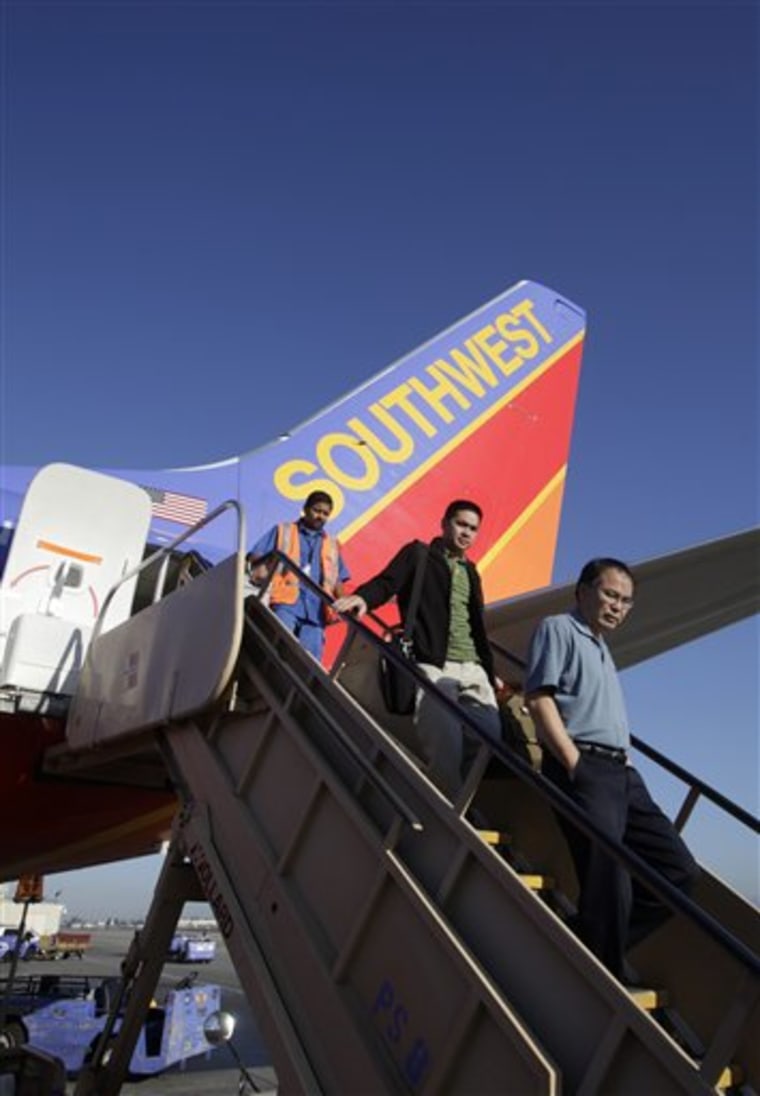Southwest Airlines and the parent of United made money in the second quarter, but the profits were overshadowed Tuesday by more job cuts and pessimism over the severe slump in travel and rising fuel costs.
Continental Airlines reported a big loss and said it would cut 1,700 more jobs.
Passengers can expect another wave of higher fees in the form of increased baggage fees to sweep through terminals around the country, with carriers trying to offset revenue lost to lower fares and promotions.
Southwest Airlines Co. broke a string of three straight losing quarters by scratching out a small gain. But Chairman and CEO Gary C. Kelly said that he couldn't predict another profit in the third quarter because of weak travel demand and higher fuel prices.
"I don't think the worst is behind us," Kelly said. "I think the worst is ahead of us, and it's primarily because of increased energy costs at this stage ... September is typically the second-worst month of the year (for air travel), which means it could be really bad."
Southwest, which has never laid off workers, announced that 1,400 employees — about 4 percent of the work force — took offers of cash and travel benefits to leave the company.
Continental Airlines Inc. lost $213 million and said it would slash about 4 percent of its workers. That's on top of 1,200 job cuts already announced at the Houston-based airline.
The airline industry has been reducing the number of people it employs for over a year as part of cost-cutting measures. Passenger airline full-time employment fell by almost 7 percent in May from the same month a year ago, according to the Bureau of Transportation Statistics.
United Airlines parent UAL Corp. posted a surprising profit, thanks to fuel-hedging gains. Then it announced it will cut capacity on international flights another 7 percent this fall, reducing flights to match the lighter demand.
Continental boosted by $5 the fees for flight reservations taken over the phone and checking bags on U.S. flights. Beginning Aug. 19, it will cost $20 for the first bag and $30 for a second when passengers check them at the airport instead of online.
United, Delta and US Airways have announced similar increases in the last few weeks, charging an extra $5 for checking bags at the airport. American said Tuesday it had not raised its bag fees. Even Southwest, which mocked fee-charging rivals not long ago, refused to rule out bag charges.
Since the recession deepened last fall, traffic on U.S. airlines has fallen every month compared with the year before. Business travel, the most lucrative kind for airlines, has been especially hard hit.
"Our success is highly correlated with the return of business travel, and we haven't seen signs of that yet," said Continental president Jeff Smisek, who is set to become CEO in January.
With high-fare business travelers replaced on many planes with bargain-seeking leisure fliers, average fares fell and led to declines in revenue that ranged from 8.8 percent at Southwest to 25.2 percent at UAL.
Dallas-based Southwest earned $54 million, or 7 cents per share in the quarter ended June 30, down sharply from $321 million, or 44 cents per share, a year earlier. Excluding one-time items, the gain would have been $59 million, or 8 cents per share.
Analysts, who don't consider one-time items, expected 7 cents per share, according to a survey by Thomson Reuters.
Revenue dipped 8.8 percent to $2.62 billion, but traffic held up well. Southwest has lured passengers with fare sales as cheap as $30 one-way.
Southwest said, however, that unless business travel rebounds strongly, its revenue per unit of capacity — an important performance measure — will fall 7 percent in the third quarter.
Southwest's costs also are rising, partly due to the price of getting employees to quit. It expects to spend $70 million on severance packages for employees who took the buyout.
Continental said it will try to use voluntary measures to cut 1,700 jobs, but layoffs could be needed. The airline recently announced it would eliminate 500 reservations jobs and offer leave to 700 flight attendants.
Continental's quarterly loss was $1.72 per share. Excluding write-downs of its fleet, the loss would have been $169 million, or $1.36 per share. Analysts expected a loss of $1.35 per share excluding the write-downs.
Revenue plunged 22.7 percent from a year ago, to $3.13 billion.
United parent UAL earned a profit of $28 million, or 19 cents per share, thanks to one-time gains. That compared to a loss of $2.74 billion a year ago, when it took huge write-downs.
Excluding the one-time gains, Chicago-based UAL would have lost $2.23 per share. Analysts expected a loss of $2.61 per share excluding items.
Revenue tumbled to $4.02 billion from $5.37 billion a year earlier.
Analysts consider UAL, the nation's third-largest airline company behind Delta and American parent AMR, to be among the weakest carriers financially. UAL said it ended June with $2.6 billion in unrestricted cash — more than its previous projection of $2.5 billion.
Shares of UAL gained 21 cents, or 6 percent, to close at $3.72; while Continental fell 75 cents, or 7.4 percent, to close at $9.42; and Southwest dropped 43 cents, or 5.9 percent, to close at $6.87.
